What Happens to Your Body During Intermittent Fasting (Hour by Hour Timeline)
From the first hunger pang to deep cellular repair, here is exactly what happens inside your body when you stop eating.
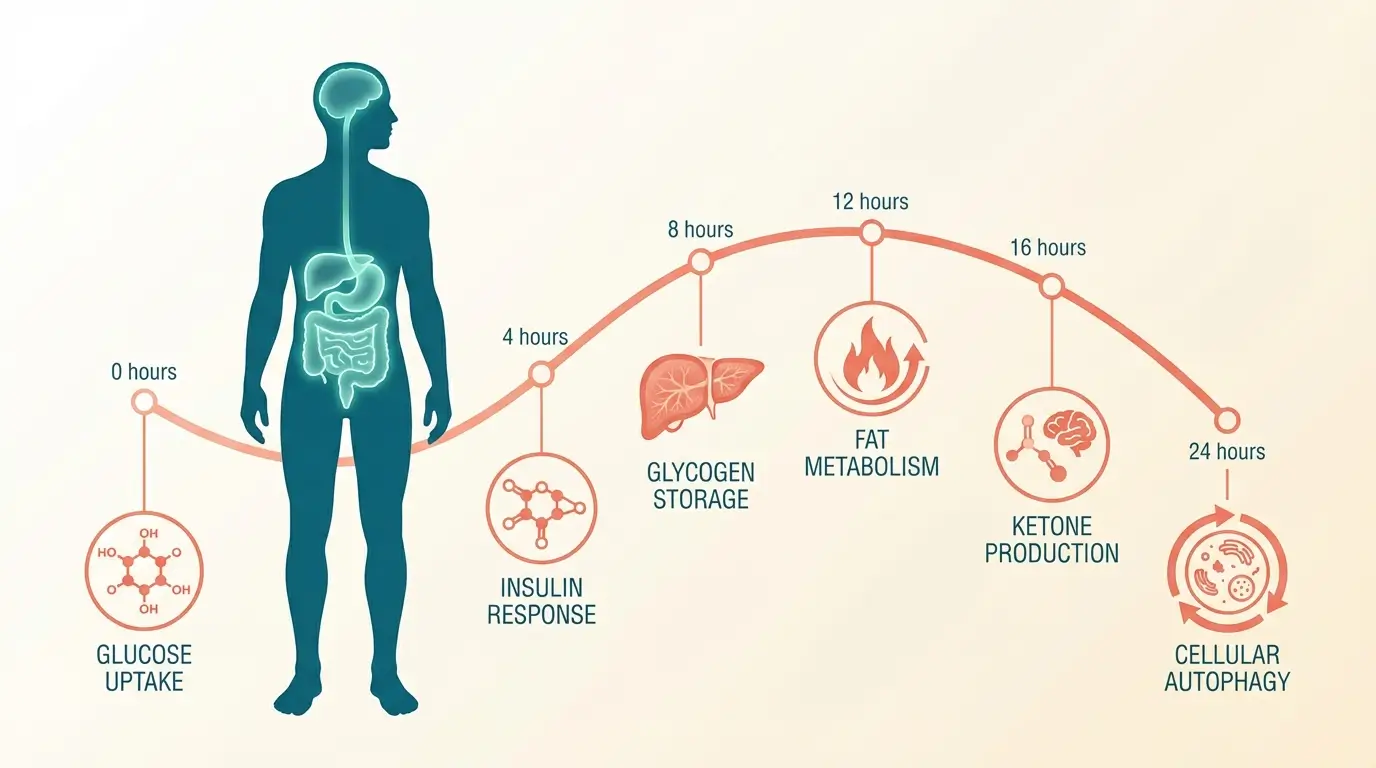
You stopped eating three hours ago. Your stomach growls. Your brain screams for a snack. But something powerful is happening beneath the surface.
Understanding what happens to your body during intermittent fasting hour by hour transforms the experience. Fasting is not starvation. It is a programmed metabolic reset that your body evolved to perform.
Most people fixate on weight loss, but the cellular repair, hormone optimization, and metabolic shifts occur in specific time windows. Miss those windows, and you miss the benefits.
This guide maps the biological changes occurring inside you right now. You will learn exactly when fat burning starts, when autophagy kicks in, and why hours 8 through 12 feel brutal while hours 16 and beyond feel almost euphoric.
Consider this your motivation to push through the tough stretches.
The Physiology of Fasting: Understanding the “Why” Before the “When”
Your body runs on two primary fuel sources. Glucose, from carbohydrates, serves as the quick, easy option. Fat, stored in adipose tissue, provides the long-burning alternative.
Metabolic flexibility = your body’s ability to switch between these fuel sources efficiently.
Three hormones orchestrate this fuel switch.
- Insulin acts as your storage hormone. When you eat, insulin rises to shuttle glucose into cells and store excess energy as fat. High insulin locks fat inside your cells.
- Glycogen is not a hormone but a storage form. Your liver holds roughly 100 grams of glycogen, which translates to approximately 400 calories of quick-access fuel [1].
- Glucagon works opposite to insulin. When blood sugar drops, glucagon signals your liver to release stored glycogen and mobilize fat.
The fasting timeline you are about to read tracks these hormones and fuel sources hour by hour. Each phase brings distinct sensations, challenges, and benefits.
Now that you understand the players, the timeline begins.
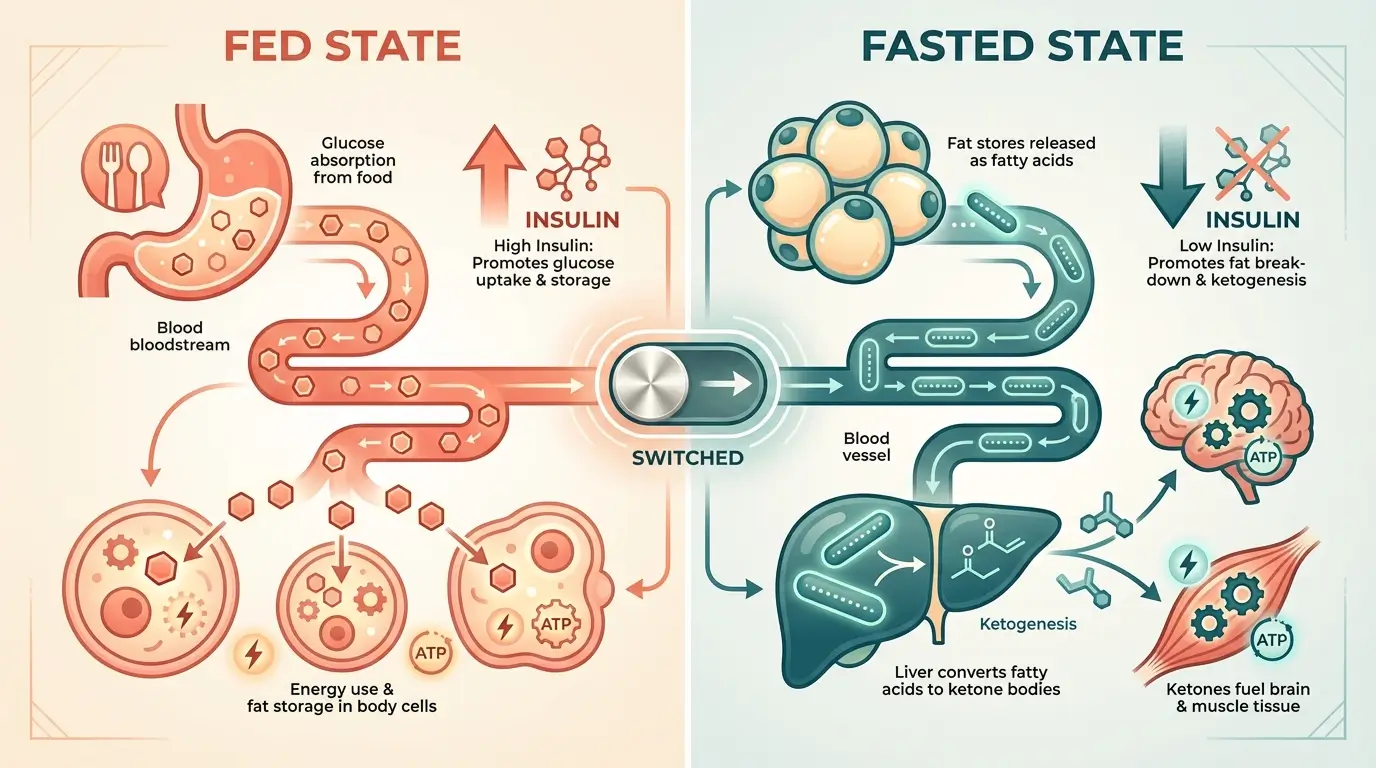
Phase 1: The Fed State (Hours 0–4)
Your body enters full digestion mode the moment you finish eating. Enzymes break down proteins, fats, and carbohydrates in your stomach and small intestine. Nutrients absorb through your intestinal lining into your bloodstream.
- Hormonal State: Insulin spikes to manage the incoming glucose [2]. Depending on your meal composition, insulin can remain elevated for two to four hours. Your body operates in “anabolic” mode, meaning it focuses on building, storing, and growing [3].
- Energy Source: Glucose from your last meal fuels every cell. Your muscles, brain, and organs run on this immediate supply [4].
- The Feeling: Satisfied, potentially sleepy if you ate a large or carb-heavy meal. Blood flow diverts to your digestive tract.
- Action Step: Do not snack. Every bite restarts this phase and delays everything that follows. Even small snacks trigger insulin release.
“Does this mean I cannot have anything at all?”
Correct. Water is fine. Black coffee or plain tea will not spike insulin significantly. But calories restart the clock.
The digestion phase winds down around hour four. Your body finishes processing and prepares for the transition ahead.
Phase 2: The Catabolic Transition (Hours 4–8)
Blood sugar stabilizes and begins dropping as your body finishes absorbing nutrients from your last meal. Digestion completes. The shift from “fed” to “fasting” metabolism begins.
- Hormonal State: Insulin levels fall steadily [5]. Your pancreas reduces insulin secretion as blood glucose normalizes [6]. This decline is gradual, not sudden.
- Energy Source: Your liver begins tapping its glycogen stores. Each glycogen molecule releases glucose to maintain stable blood sugar [7]. Think of glycogen as your body’s checking account, while fat reserves are the savings account you have not touched yet.
- The Feeling: You might feel “empty” but not genuinely hungry yet [8]. This emptiness differs from true hunger. Your stomach is simply not processing food anymore.
Your body is transitioning from “catabolic” mode (building/storage) to “catabolic” mode (breakdown/mobilization). The hormonal environment shifts toward accessing stored energy rather than storing new energy.
Action Step: Stay busy. This phase passes quickly for most people, especially if you fast overnight. Sleep through hours 0 through 8, and you wake up already in transition.
As insulin continues dropping, your body prepares to tap deeper reserves.
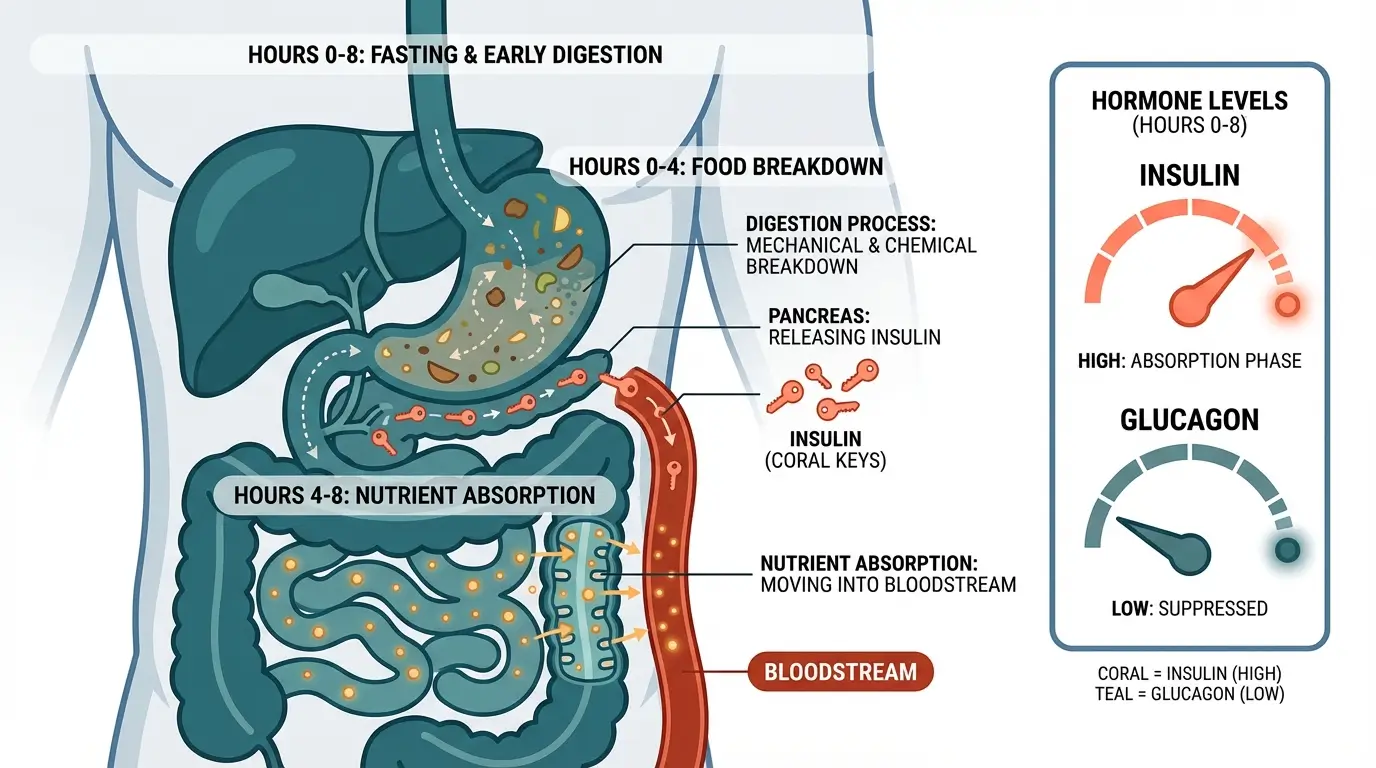
Phase 3: The Glycogen Drop and False Hunger (Hours 8–12)
This phase separates casual dieters from committed fasters. Your liver glycogen stores drop significantly, and your body sends alarm signals demanding easy fuel [9].
- What is Happening: Glycogen reserves deplete by roughly 20 to 30 percent during this window. Your brain, which prefers glucose, notices the declining supply and triggers hunger hormones.
- The Ghrelin Spike: Ghrelin = hunger hormone. Ghrelin does not rise continuously. It spikes in waves that correspond to your normal meal times [10]. If you typically eat breakfast at 8 AM, expect a ghrelin surge around 8 AM. This is conditioned hunger, not genuine metabolic need.
The waves last approximately 20 to 30 minutes, then subside. Hunger is not linear; it comes and goes.
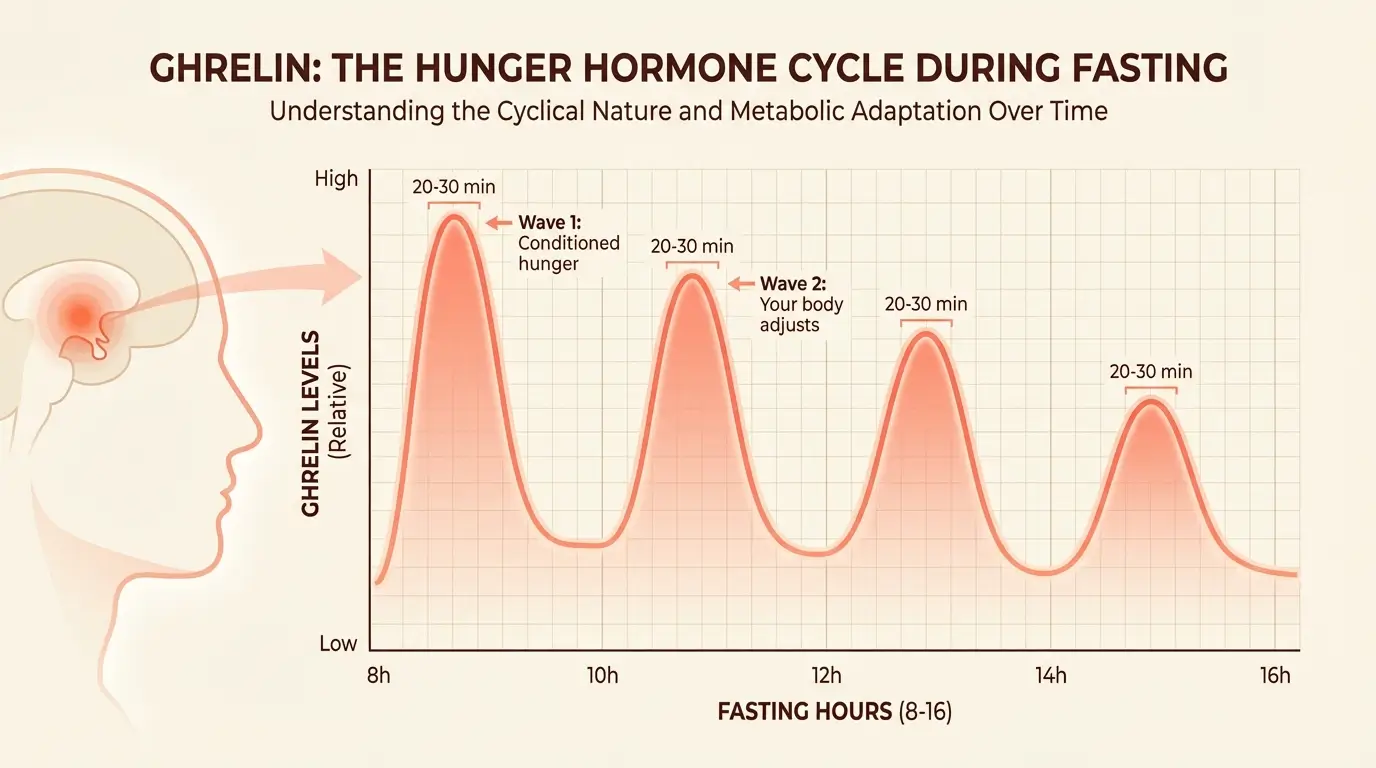
- Hormonal State: Human Growth Hormone (HGH) begins climbing. Research shows HGH increases significantly during fasting periods to preserve lean muscle mass [11]. This protective mechanism prevents your body from breaking down muscle for fuel.
- The Struggle: Most beginners quit here. The late-night snacking urge hits hardest between hours 10 and 12. Your brain remembers every snack you have ever eaten and suggests all of them.
(Ed. note: The discomfort you feel at hour 10 is not your body failing. It is your body succeeding at triggering the metabolic switch.)
Action Step: Drink sparkling water or herbal tea. The carbonation and volume distend your stomach, which sends fullness signals to your brain and quiets ghrelin temporarily. Adding a pinch of salt addresses early electrolyte needs.
Push through this phase, and the rewards multiply in the hours ahead.
Phase 4: The Metabolic Switch (Hours 12–16)
You have reached the turning point. Your body crosses from sugar-burning to fat-burning metabolism. This is why 16:8 intermittent fasting protocols exist; you want to spend time in this zone.
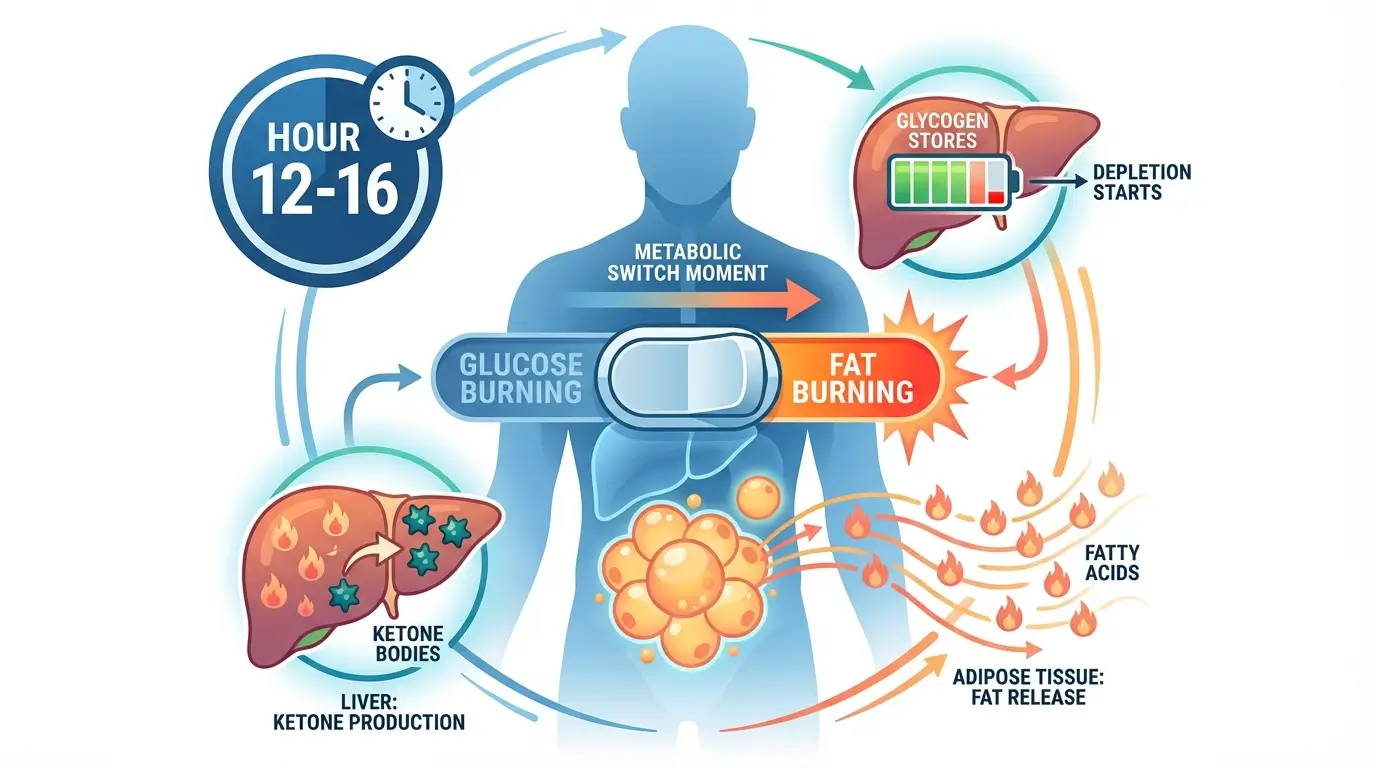
- What is Happening: Liver glycogen drops to levels that trigger lipolysis = fat breakdown [12]. Your adipose tissue releases triglycerides into your bloodstream. These triglycerides travel to your liver, which converts them into ketone bodies. Ketones serve as an alternative fuel source for your brain and muscles [13].
- Fat Burning Begins: Lipolysis accelerates significantly after hour 12. Your body mobilizes fatty acids from stored fat cells at increasing rates [14]. This is the metabolic state people seek when they say they want to “burn fat.”
- Hormonal State: Insulin reaches its lowest point of the fasting period. Low insulin allows fat cells to release their contents. Norepinephrine (adrenaline) increases to maintain energy and alertness [15]. You may feel “wired” or unusually focused. This is not anxiety; it is your body’s natural response to mobilizing energy stores. Cortisol rises slightly to support gluconeogenesis = the creation of new glucose from non-carbohydrate sources like amino acids and glycerol [16].
- Weight Loss Factor: The 16:8 protocol places your eating window at 8 hours and your fasting window at 16 hours. You spend roughly 4 hours in this fat-burning state daily. Accumulated over weeks and months, this drives measurable fat loss.
“I have been fasting for 14 hours and feel great. Should I stop here?”
You can, but pushing to hour 16 yields additional benefits. The difference between hour 14 and hour 16 is significant for fat oxidation rates.
Action Step: Light exercise during this phase accelerates fat mobilization. A 20-minute walk increases fatty acid release from adipose tissue without spiking cortisol excessively [17]. Avoid intense exercise; save that for your fed state.
Your body is now running increasingly on fat. The next phase takes this further.
Phase 5: Peak Fat Burning and Autophagy Begins (Hours 16–24)
You have entered the zone where cellular magic happens. Glycogen stores are depleted. Your body runs predominantly on fat and ketones [18]. But fat loss is only part of the story.
- Autophagy Activates: Autophagy = “self-eating” in Greek. This cellular cleanup process recycles damaged proteins, dysfunctional mitochondria, and cellular debris [19]. Think of it as your body’s internal recycling program. Old cellular components break down, and the raw materials rebuild into new, functional structures.
Autophagy rates increase significantly when nutrients are absent and cellular stress rises [20]. Research indicates autophagy markers rise substantially between hours 16 and 24 of fasting [21].
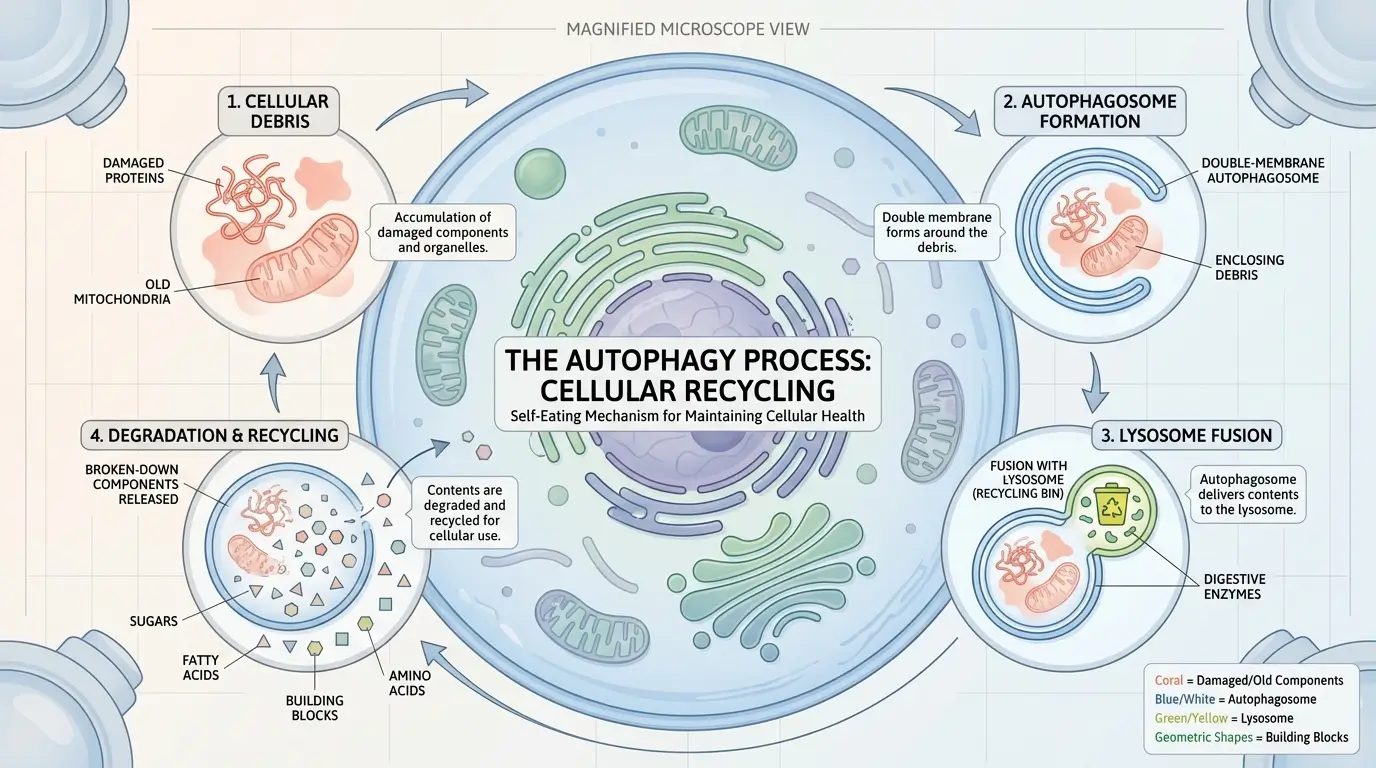
- Why This Matters: Accumulated cellular damage contributes to aging, inflammation, and disease. Regular autophagy activation through fasting may slow these processes. Animal studies show extended lifespan with periodic autophagy activation [22]. Human research continues, but the mechanisms appear conserved across species.
- Hormonal State: HGH reaches peak levels. Studies document increases of up to 1250 percent in men during 24-hour fasts [23]. Women experience significant increases as well, though absolute levels differ. This HGH surge preserves muscle mass while your body burns fat.
Brain-Derived Neurotrophic Factor (BDNF) increases during extended fasting [24]. BDNF supports neuron growth, learning, and memory. This explains the mental clarity many fasters report, often called “fasting focus.”
- The Experience: Many fasters describe unusual mental clarity during hours 18 through 24. Your brain runs efficiently on ketones, which provide steady energy without the glucose fluctuations that cause afternoon crashes [25].
Action Step: Schedule demanding cognitive work during this window. Deep work, creative projects, and complex problem-solving benefit from the ketone-fueled brain state. Your focus may surprise you.
For most people practicing daily intermittent fasting, hour 24 marks the endpoint. The phases ahead apply to extended fasting protocols.
Hormone & Metabolic Changes During a 24-Hour Fast
Relative levels compared to peak values during the fasting period
- Insulin
- HGH
- Ghrelin
- Fat Burning
| Time Period | Insulin | HGH | Ghrelin | Fat Burning |
|---|---|---|---|---|
| Hours 0-4 | 100% | 10% | 20% | 5% |
| Hours 4-8 | 60% | 15% | 30% | 10% |
| Hours 8-12 | 30% | 25% | 80% | 25% |
| Hours 12-16 | 15% | 50% | 40% | 60% |
| Hours 16-24 | 5% | 100% | 25% | 100% |
Phase 6: Deep Ketosis and Immune Reset (Hours 24–48)
This phase applies to advanced fasters practicing OMAD (One Meal A Day), Monk Fasts (36 hours), or therapeutic extended fasts. Proceed with experience and, ideally, medical guidance.
- What is Happening: Deep ketosis establishes as your primary metabolic state [26]. Blood ketone levels rise to 1.0 to 3.0 mmol/L in most individuals. Inflammation markers drop measurably [27].
- Gut Regeneration: Your intestinal lining contains stem cells that activate during prolonged fasting. Research shows these stem cells begin regenerating the gut epithelium when nutrients are absent [28]. This process may explain why some people with digestive issues report improvements after extended fasts.
- The "Fasting High": Many extended fasters report euphoria during hours 30 through 48. This results from elevated ketones, increased norepinephrine, and potentially endorphin release [29]. Your body enters a state historically associated with hunting and foraging, where alertness and positive mood supported survival.
"I feel amazing at hour 30. Is this normal?"
Yes. Your body is optimized for periods without food. The euphoria signals that your metabolism functions correctly in a fasted state.
Safety Considerations:
- Stop if you experience true dizziness that does not resolve with movement.
- Stop if you feel genuine weakness, not fatigue. Fatigue is normal; weakness where you cannot perform basic tasks is not.
- Electrolyte depletion becomes a real concern beyond 24 hours. Supplementing sodium, potassium, and magnesium prevents complications [30].
- Anyone with diabetes, eating disorder history, or chronic health conditions should consult a healthcare provider before fasting beyond 24 hours.
- The benefits continue accumulating, but so do the risks. Proceed intentionally.
Phase 7: Long-Term Adaptation (Hours 48–72+)
Extended fasting beyond 48 hours produces profound metabolic changes but requires experience and medical supervision. This section is informational, not a recommendation for beginners.
- What is Happening: Your immune system undergoes significant restructuring. Research by Valter Longo at USC demonstrated that prolonged fasting triggers breakdown of old, damaged white blood cells [31]. When you refeed, stem cells generate new immune cells. This "immune reset" may explain reported benefits for autoimmune conditions, though clinical applications remain under investigation.
- Insulin Sensitivity: Reaches maximum improvement during extended fasts. Cells become highly responsive to insulin, which benefits individuals with insulin resistance or metabolic syndrome [32]. This heightened sensitivity persists for days after refeeding.
- Gluconeogenesis Increases: Your liver produces glucose from amino acids and glycerol to maintain blood sugar for glucose-dependent tissues like red blood cells [33]. Protein breakdown increases during this phase, which is why extended fasts carry muscle loss risk without proper refeeding.
- Circadian Rhythm Effects: Extended fasting can reset circadian rhythms. Your internal clock uses food timing as a primary cue [34]. Multi-day fasts may benefit individuals with disrupted sleep-wake cycles, though this application requires more research.
Caution: Fasts beyond 48 hours should involve medical supervision, especially for first attempts. Electrolyte imbalances, blood pressure changes, and refeeding syndrome become genuine risks [35].
Breaking an extended fast correctly matters more than the fast itself. The next section covers this often-overlooked step.
How to Break Your Fast Correctly
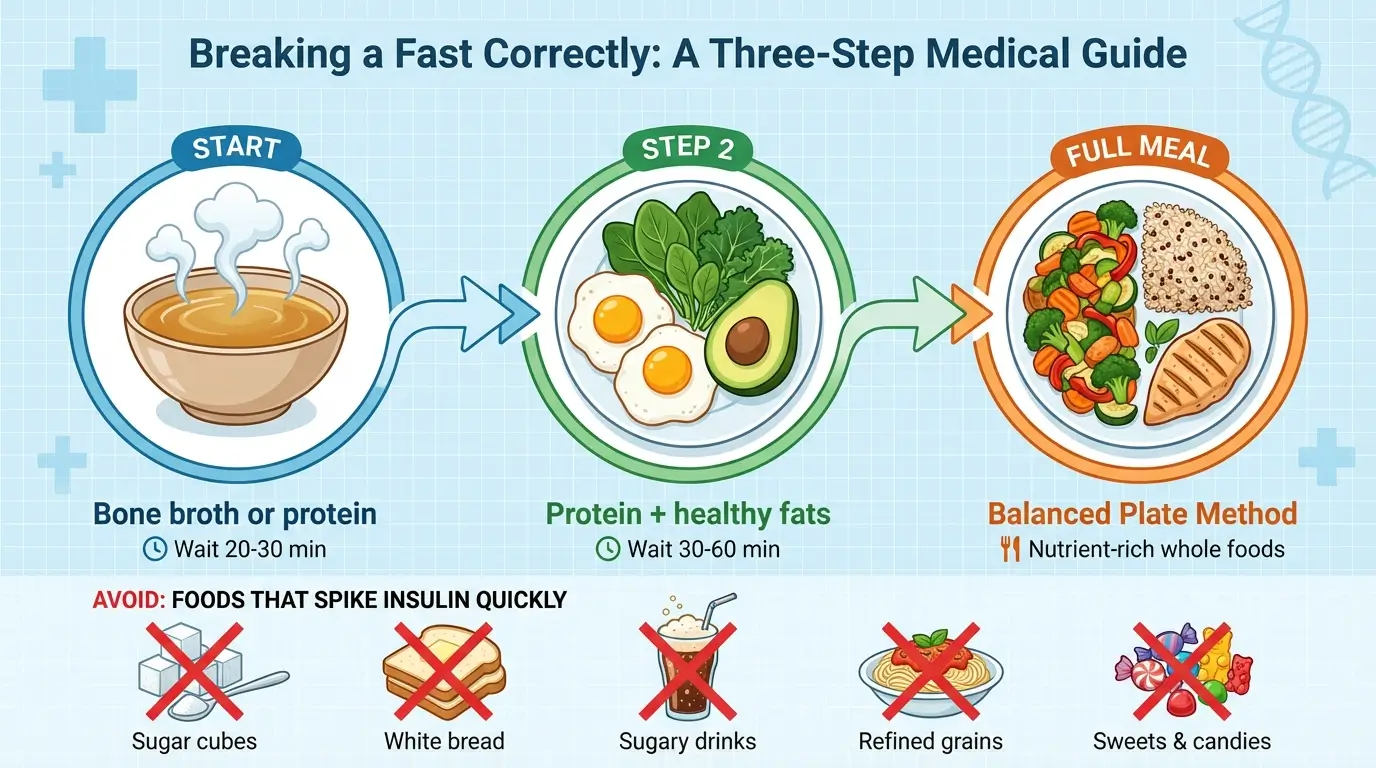
The refeeding phase determines whether you capture fasting benefits or create new problems. Most people overlook this step and suffer for it.
The Danger: Breaking a fast with large amounts of carbohydrates triggers a massive insulin spike. Blood sugar rises rapidly, then crashes, causing "food coma," reactive hypoglycemia, and intense subsequent hunger [36]. You can undo much of your hard work with a poor first meal.
The longer your fast, the more carefully you should break it. A 16-hour fast requires less caution than a 48-hour fast.
The Strategy for Fasts Under 24 Hours:
- Start with protein and fat. Eggs, avocado, nuts, or a small portion of meat work well. These foods produce minimal insulin response while providing satiation.
- Wait 20 to 30 minutes before eating more. This allows your digestive system to wake up and prevents overwhelming your gut with volume it cannot handle.
- Eat your full meal after this buffer period. Include vegetables, protein, and moderate carbohydrates.
The Strategy for Extended Fasts (24+ Hours):
- Begin with bone broth. The amino acids and minerals support digestive function without stressing your gut [37]. Drink 8 to 12 ounces slowly over 15 minutes.
- Wait 30 to 60 minutes.
- Introduce soft, easily digestible foods. Cooked vegetables, small portions of fish, or scrambled eggs work well.
- Wait another hour before eating a normal-sized meal.
Foods to Avoid When Breaking Any Fast:
- Sugar and refined carbohydrates spike blood glucose excessively after a fast.
- Alcohol hits harder on an empty stomach and stresses your liver.
- Large volumes of raw vegetables can cause bloating and digestive distress.
- Highly processed foods trigger inflammation and cravings.
"Can I just eat normally after a 16-hour fast?"
Technically, yes. But eating mindfully, starting with protein and fat, produces better outcomes. You will feel better and maintain steadier energy throughout the day.
Common Side Effects and Troubleshooting
Fasting produces predictable side effects, especially during your first few weeks. Most resolve with simple interventions.
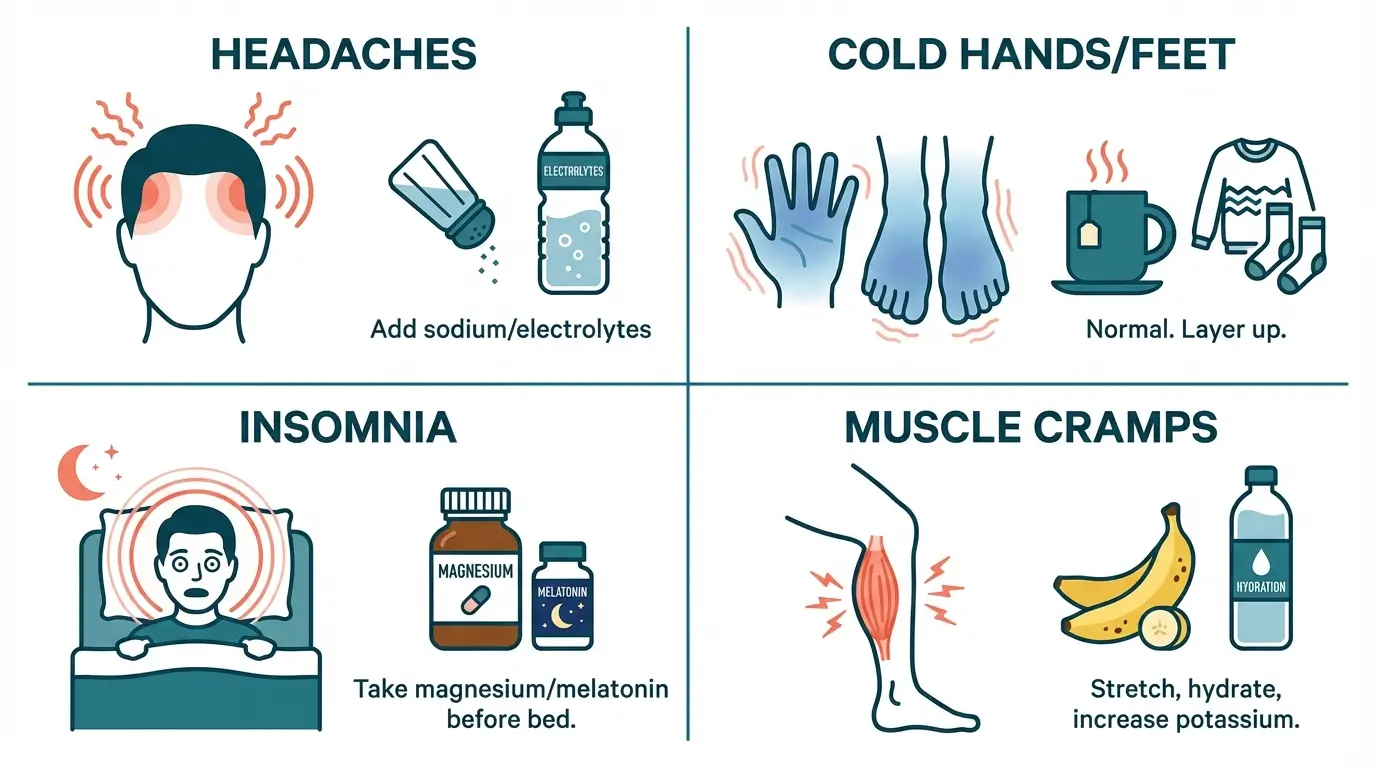
- Headaches: Sodium depletion causes most fasting headaches. Your kidneys excrete more sodium when insulin levels drop [38]. The solution is simple. Dissolve 1/4 teaspoon of salt in water or place salt directly on your tongue. Electrolyte supplements work as well. Headaches typically resolve within 20 to 30 minutes of sodium intake.
Caffeine withdrawal also causes headaches if you normally drink coffee with breakfast. Black coffee during your fast prevents this.
- Cold Hands and Feet: Blood flow redirects during fasting. Your body prioritizes core organs and adipose tissue (to mobilize fat) over extremities [39]. This is normal and harmless. Layer clothing or drink warm beverages.
- Insomnia: Elevated cortisol and orexin (a wakefulness neurotransmitter) can disrupt sleep, especially early in your fasting practice [40]. This typically resolves within one to two weeks as your body adapts.
Magnesium glycinate (200 to 400 mg before bed) supports sleep quality and addresses potential magnesium depletion. Avoid fasting protocols that place your eating window too close to bedtime; digestion can also disrupt sleep.
- Irritability: Low blood sugar and ghrelin spikes cause irritability, particularly during hours 8 through 12. This improves dramatically after two to three weeks of consistent practice. Your hunger hormones adapt to your new eating schedule [41].
- Muscle Cramps: Electrolyte imbalances cause cramping, especially in calves and feet. Potassium and magnesium supplementation resolves this. Foods like avocados and leafy greens during eating windows provide ongoing support.
Summary FAQ
Your Fasting Journey Starts Now
You now understand what happens to your body during intermittent fasting hour by hour. The journey moves through distinct metabolic zones, from the fed state through glycogen depletion, into fat burning, and toward cellular repair.
The toughest hours are 8 through 12. Ghrelin spikes, your brain demands food, and quitting seems reasonable. But the rewards arrive at hour 16 and beyond, where fat burning accelerates, autophagy activates, and mental clarity peaks.
Start with a 12-hour fast tonight. Finish dinner by 8 PM, eat breakfast at 8 AM. Once this feels comfortable, push your eating window by one hour every few days. Progress from 12 hours to 14, then to 16. Most people adapt fully within two to three weeks.
Every hour you fast, your body performs work you cannot see. Fat cells release their contents. Damaged proteins recycle. Insulin sensitivity improves. Trust the process, push through the discomfort, and let your biology do what it evolved to do.
Your next meal can wait. Your metabolic health cannot.
References
- [1] Cahill, G.F. "Fuel Metabolism in Starvation". Annual Review of Nutrition. 2006.
- [2] Anton, S.D. et al. "Flipping the Metabolic Switch: Understanding and Applying the Health Benefits of Fasting". Obesity. 2018.
- [3] Mattson, M.P. et al. "Impact of intermittent fasting on health and disease processes". Ageing Research Reviews. 2017.
- [4] Patterson, R.E. et al. "Intermittent Fasting and Human Metabolic Health". Journal of the Academy of Nutrition and Dietetics. 2015.
- [5] Kerndt, P.R. et al. "Fasting: The History, Pathophysiology and Complications." Western Journal of Medicine. 1982.
- [6] Felig, P. et al. "Amino acid metabolism during prolonged starvation." Journal of Clinical Investigation. 1969.
- [7] Rothman, D.L. et al. "Quantitation of hepatic glycogenolysis and gluconeogenesis in fasting humans with 13C NMR". Science. 1991.
- [8] Natalucci, G. et al. "Spontaneous 24-h ghrelin secretion pattern in fasting subjects". Journal of Clinical Endocrinology & Metabolism. 2005.
- [9] Cahill, G.F. "Starvation in Man". New England Journal of Medicine. 1970.
- [10] Cummings, D.E. et al. "A Preprandial Rise in Plasma Ghrelin Levels Suggests a Role in Meal Initiation in Humans". Diabetes. 2001.
- [11] Ho, K.Y. et al. "Fasting enhances growth hormone secretion and amplifies the complex rhythms of growth hormone secretion in man". Journal of Clinical Investigation. 1988.
- [12] Klein, S. et al. "Progressive alterations in lipid and glucose metabolism during short-term fasting in young adult men". American Journal of Physiology. 1993.
- [13] Veech, R.L. "The therapeutic implications of ketone bodies". Prostaglandins, Leukotrienes and Essential Fatty Acids. 2004.
- [14] Jensen, M.D. et al. "Lipolysis during fasting". Journal of Clinical Investigation. 1987.
- [15] Zauner, C. et al. "Resting energy expenditure in short-term starvation is increased as a result of an increase in serum norepinephrine". American Journal of Clinical Nutrition. 2000.
- [16] Nuttall, F.Q. et al. "Regulation of hepatic glucose production and the role of gluconeogenesis in humans". Diabetes. 2008.
- [17] Horowitz, J.F. "Fatty acid mobilization from adipose tissue during exercise". Trends in Endocrinology & Metabolism. 2003.
- [18] Puchalska, P. & Crawford, P.A. "Multi-dimensional Roles of Ketone Bodies in Fuel Metabolism, Signaling, and Therapeutics". Cell Metabolism. 2017.
- [19] Levine, B. & Kroemer, G. "Autophagy in the Pathogenesis of Disease". Cell. 2008.
- [20] Mizushima, N. & Komatsu, M. "Autophagy: Renovation of Cells and Tissues". Cell. 2011.
- [21] Alirezaei, M. et al. "Short-term fasting induces profound neuronal autophagy". Autophagy. 2010.
- [22] Madeo, F. et al. "Essential role for autophagy in life span extension". Journal of Clinical Investigation. 2015.
- [23] Hartman, M.L. et al. "Augmented growth hormone (GH) secretory burst frequency and amplitude mediate enhanced GH secretion during a two-day fast in normal men". Journal of Clinical Endocrinology & Metabolism. 1992.
- [24] Mattson, M.P. "Energy intake, meal frequency, and health: a neurobiological perspective". Annual Review of Nutrition. 2005.
- [25] Owen, O.E. et al. "Brain Metabolism during Fasting". Journal of Clinical Investigation. 1967.
- [26] Cahill, G.F. & Veech, R.L. "Ketoacids? Good medicine?". Transactions of the American Clinical and Climatological Association. 2003.
- [27] Faris, M.A. et al. "Intermittent fasting during Ramadan attenuates proinflammatory cytokines and immune cells". Nutrition Research. 2012.
- [28] Mihaylova, M.M. et al. "Fasting Activates Fatty Acid Oxidation to Enhance Intestinal Stem Cell Function". Cell Stem Cell. 2018.
- [29] Fond, G. et al. "Fasting in mood disorders: neurobiology and effectiveness". Progress in Neuro-Psychopharmacology and Biological Psychiatry. 2013.
- [30] Finnell, J.S. et al. "Is fasting safe? A chart review of adverse events during medically supervised, water-only fasting". BMC Complementary and Alternative Medicine. 2018.
- [31] Cheng, C.W. et al. "Prolonged Fasting Reduces IGF-1/PKA to Promote Hematopoietic-Stem-Cell-Based Regeneration and Reverse Immunosuppression". Cell Stem Cell. 2014.
- [32] Halberg, N. et al. "Effect of intermittent fasting and refeeding on insulin action in healthy men". Journal of Applied Physiology. 2005.
- [33] Gerich, J.E. et al. "Renal gluconeogenesis: its importance in human glucose homeostasis". Diabetes Care. 2001.
- [34] Panda, S. "Circadian physiology of metabolism". Science. 2016.
- [35] Mehanna, H.M. et al. ["Refeeding syndrome: what it is, and how to prevent and treat it"](https://doi.org/10.1136/bmj front.front). BMJ. 2008.
- [36] Greenfield, J.R. et al. "Oral glutamine increases circulating glucagon-like peptide 1, glucagon, and insulin concentrations in lean, obese, and type 2 diabetic subjects". American Journal of Clinical Nutrition. 2009.
- [37] Samonina, G. et al. "Protection of gastric mucosal integrity by gelatin and simple proline-containing peptides". Pathophysiology. 2000.
- [38] DeFronzo, R.A. "The effect of insulin on renal sodium metabolism". Diabetologia. 1981.
- [39] Landsberg, L. "Feast or famine: the sympathetic nervous system response to nutrient intake". Cellular and Molecular Life Sciences. 2006.
- [40] Nixon, J.P. et al. "Sleep disorders, obesity, and aging: the role of orexin". Ageing Research Reviews. 2015.
- [41] Frecka, J.M. & Mattes, R.D. "Possible entrainment of ghrelin to habitual meal patterns in humans". American Journal of Physiology. 2008.
- [42] Greenberg, J.A. et al. "Coffee, diabetes, and weight control". American Journal of Clinical Nutrition. 2006.
- [43] Moro, T. et al. "Effects of eight weeks of time-restricted feeding (16/8) on basal metabolism, maximal strength, body composition". Journal of Translational Medicine. 2016.
- [44] Heilbronn, L.K. et al. "Glucose tolerance and skeletal muscle gene expression in response to alternate day fasting". Obesity Research. 2005.
- [45] Zouhal, H. et al. "Exercise training and fasting: current insights". Open Access Journal of Sports Medicine. 2020.
